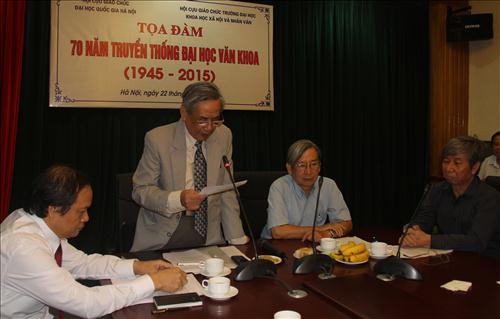
Professor Vu Duong Ninh (Chairman of the Association of Retired Teachers of the School):A 70-year tradition, like an ever-flowing stream…

Professor, Doctor, People's Teacher Vu Duong Ninh
Looking back over the 70-year journey from the Faculty of Literature, Hanoi University to the University of Social Sciences and Humanities today, what can we learn about the school's traditions? These can be summarized in the following points:
A prominent and consistent feature throughout the school's existence and development is...patriotic tradition,Ready to sacrifice for independence and unity, to protect sovereignty and territory. The first generation of professors at the Faculty of Humanities, mostly patriotic intellectuals, heeding the call of the Fatherland and inspired by President Ho Chi Minh, dedicated themselves to education and scientific research during the two arduous and perilous wars of national liberation. Following in the footsteps of their predecessors, many cadres and students in the 1960s and 70s enthusiastically joined the "Crossing the Truong Son Mountains" to save the country, contributing to the liberation of the South and the reunification of the nation. This dedication and sacrifice, exemplified by heroes and martyrs such as Le Anh Xuan, Chu Cam Phong, and many others, has built eternal monuments in the pride of generations of the Faculty of Humanities today.
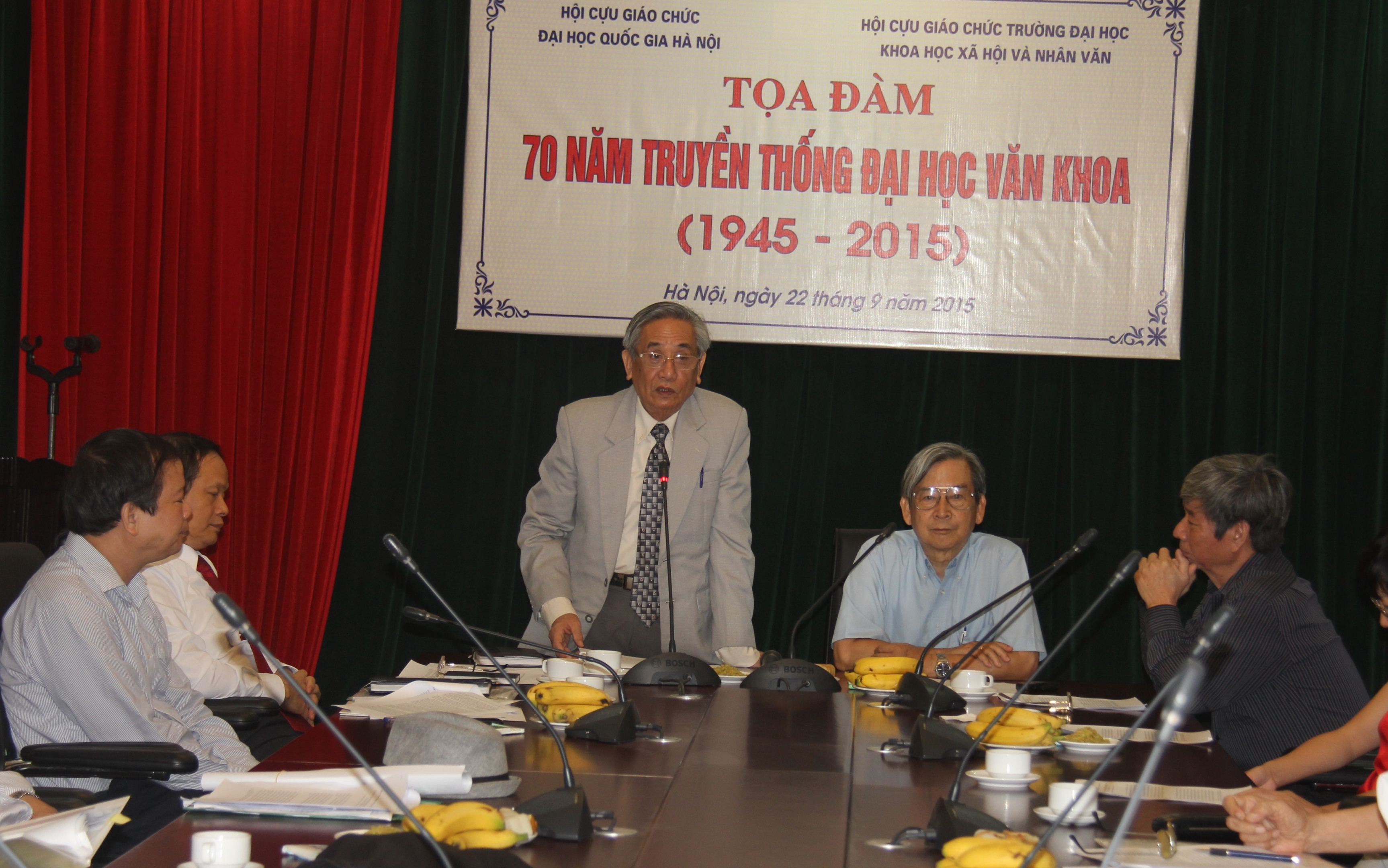
A seminar on the 70th anniversary of the Faculty of Literature, organized by the Association of Retired Faculty Members of the University of Social Sciences and Humanities, was held at the end of September 2015.
As a major scientific institution of the country,The spirit of perseverance in striving for scientific excellence.This has become the heartfelt aspiration and desire of generations of teachers and students, a deeply ingrained tradition of the school. The pioneering professors, along with the subsequent scientific staff, have devoted their intellect and efforts to researching social and humanities issues, leaving behind many renowned works of theoretical and practical significance. It can be said that throughout the school's development, numerous significant works have emerged, addressing issues related to national cultural traditions as well as resolving pressing problems arising in the country's development process. These scientific products are a valuable asset contributing to the nation's knowledge base, leaving behind lasting values.
Achieving these two things is the result ofTraditions are inherited and continuously connected.Between generations of teachers and students, for the past 70 years, students, researchers, and young lecturers have diligently studied the work of previous generations of scientists, both absorbing and continuing the tradition, while also supplementing and enhancing many scientific arguments, gradually forming continuous "waves of knowledge" that develop endlessly. The development of many long-standing departments and faculties in our university is a concrete result of this spirit of continuous inheritance and continuity, without interruption or stagnation, creating the fundamental conditions for a long and endless scientific journey.
From its inception, especially during the period of Hanoi University, foreign relations were emphasized, primarily with major universities in socialist countries such as Lomonosov University, Peking University, and Humboldt University. With the Doi Moi (Renovation) period, the doors to foreign relations opened wider, and the university's international relations developed strongly. In addition to socialist partners, the university and its faculties quickly established connections with universities in France, the United States, Japan, Australia, and many universities in Southeast Asia. To date, the number of countries and universities with which our university has relations has increased dramatically. This creates a unique characteristic.tradition of international integration,This has yielded results in many areas of training, research, and scientific exchange… Of particular interest is the publication of scientific works by our university's authors in prestigious international journals, which is encouraged and has already yielded initial results. Clearly, today, international integration is an essential requirement for creating a crucial intellectual resource for the development of social sciences and humanities in our country.
Finallyhumanist tradition,True to its name, the university's 70 years of existence and development have left a profound mark on the human relationships between teachers and students, between generations, and between the university and society. Therefore, the University of Social Sciences and Humanities has earned the trust of society, not only in its academic content but also in its lifestyle and conduct in communication and all aspects of life. It can be affirmed that this humanistic tradition has created a healthy and pure educational environment, leading to success in promoting these traditions.
Meritorious Teacher Nguyen Xuan Luong (former Secretary of Hanoi University):Trang Duong - Van Tho: Unforgettable memories!
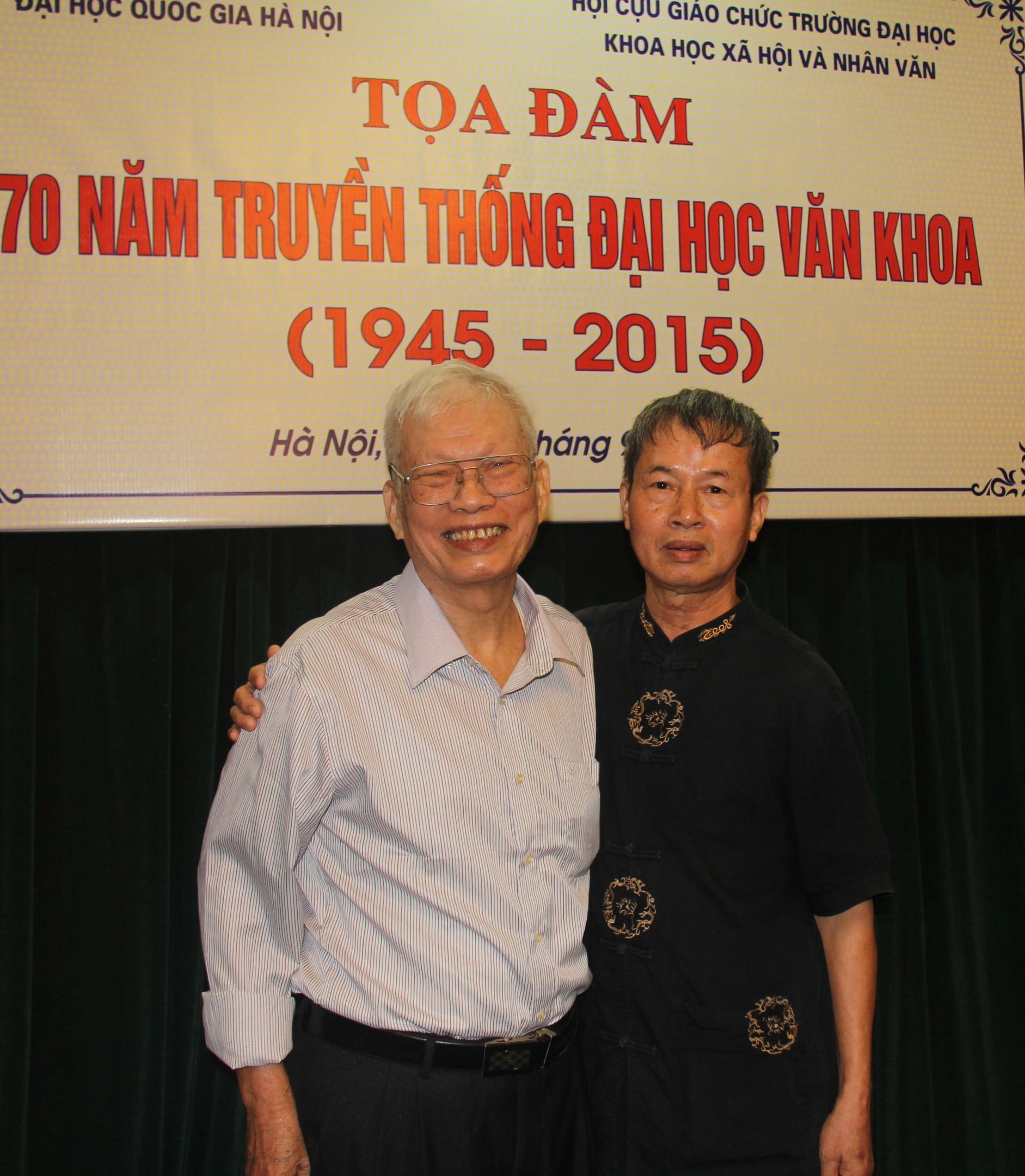
Distinguished Teacher Nguyen Xuan Luong (on the left)
In 1965, the American invaders massively deployed troops to South Vietnam and launched a war of destruction in the North. I received orders from the Dean's Office and the Faculty's Party Committee (Faculty of Literature, Hanoi University) to go ahead to the evacuation area in Van Tho commune, Dai Tu district (Thai Nguyen province). The location designated by the University for the Literature and History faculties was in Van Tho commune. The History Faculty was in Chua hamlet, and the Literature Faculty was in the Thong Nhat and Trang Duong cooperatives. To ensure secrecy, the evacuation area was called Zone B, designated T04-E, where T04 stood for Hanoi University and E for the Literature Faculty. We were led by local officials to each household to ask for accommodation for the staff, and every family was willing to help.
Alongside finding accommodation, I also signed contracts with two cooperatives to build classrooms, a kitchen, and a library. According to the agreement, the cooperatives provided the wood for the building frames, while the roofing and plastering were handled by students and faculty members.
After a few weeks, the majority of staff and students moved to the evacuation area by train, car, bicycle, and on foot. Our staff stayed in local homes and received a warm welcome and assistance.
To expedite the construction of the classrooms, the Faculty quickly mobilized several student groups to participate in the building. Thousands upon thousands of thatch sheets were needed for roofing. Despite extremely meager and scarce food, groups of students still crossed the Trang Duong pass and climbed the slopes, venturing into the forest to cut bamboo to make thatch. The class came up with the idea of setting a competition target for the number of thatch sheets each person had to produce, and thanks to that, after a short time, they had enough for the construction. The Faculty built four classrooms and one library. The classrooms were designed in a semi-submerged, semi-above-ground style, with mounds around the sides, thatched roofs, walls made of thatch and straw mixed with earth, and simple wooden and bamboo desks and chairs. The entire Faculty had five kitchens: one for staff and four for students. To improve meals, the Faculty's catering department requested a plot of land from the cooperative to raise pigs.
After a period of preparing the infrastructure, on October 15, 1965, the Faculty of Literature, along with other faculties, began its first academic year in Van Tho. Teaching and learning gradually became more organized. Departmental groups regularly held thematic discussions and organized seminars. Scientific research, practical training, and field trips were also intensified. The Linguistics group sent faculty and students to Hoa An (Cao Bang) for fieldwork; and organized second and third-year students to investigate the Tay and Nung forests. The Folklore Literature group, under the direction of Professor Vo Quang Nhon and several other faculty members, collected Roi songs – Tay folk songs – in Quoc Tuan commune.
Despite the difficulties of travel during wartime, the Faculty invited renowned writers and poets such as Nguyen Dinh Thi, Hoang Trung Thong, Nguyen Hong, Xuan Dieu, and Huy Can to speak and interact with students. These talks left a deep impression on both faculty and students.
In early 1969, the US imperialists declared an unconditional end to the bombing of North Vietnam. Hanoi University, Faculty of Literature, moved from Van Tho, Trang Duong back to Hanoi. After that, the Faculty of Literature was evacuated three more times: to Ung Hoa, Ha Tay; to Hiep Hoa, Ha Bac; and then to La Khe, La Noi.
For over four years living in the Van Tho - Trang Duong mountain forest, facing many hardships and difficulties, the teachers and students of the Faculty of Literature remained steadfast, overcoming numerous challenges and difficulties to fulfill their political mission.
Memories of the years spent in the Trang Duong forest region remain vivid in the minds of the faculty and students of the Department of Literature. I borrow the words of student Le Thong's poem, recorded while fighting on the Southern battlefield, recalling his memories of Trang Duong:
Now I'm traveling along the entire Truong Son mountain range.
I remember the slope full of wild berries and bamboo shoots.
And the commemoration of Trang Duong became a flame.
The feeling still burns brightly in my heart.
Looking ahead to future development, I am confident that with the leadership of Hanoi National University, the Faculty of Social Sciences and Humanities, and the unity, dynamism, and creativity of generations of staff and students, the two faculties of Literature and Linguistics will overcome challenges, further shine with their capabilities and intellect, and live up to their position as leading research centers in social sciences and humanities nationwide.
Assoc. Prof. Dr. Vuong Dinh Quyen (former Deputy Head of the Department of History):The quality of education is what makes the Department of History so special!
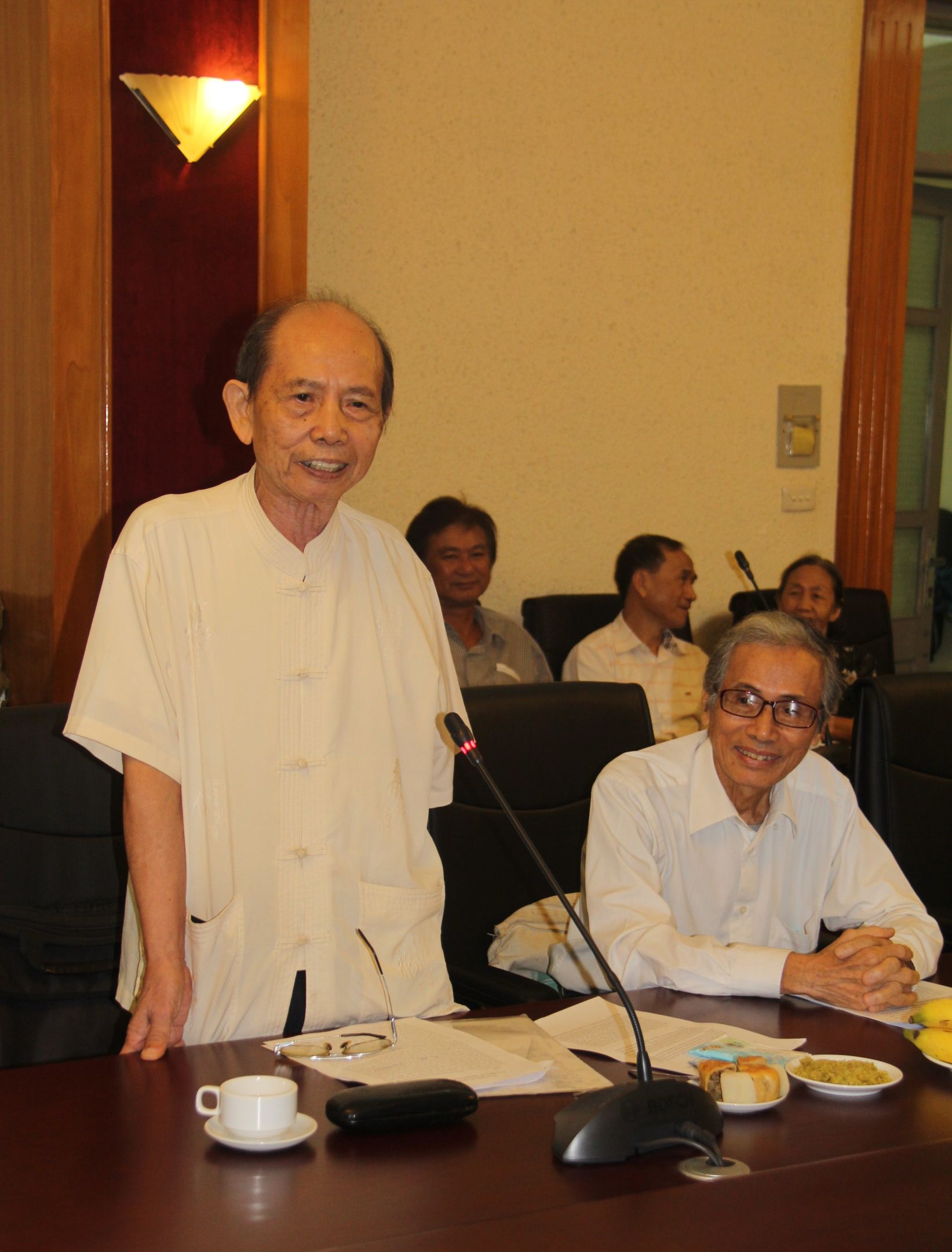
Associate Professor and Meritorious Teacher Vuong Dinh Quyen speaks at the seminar commemorating 70 years of tradition.
I was a student in the 9th cohort of the History Department, Hanoi University, entering the university in 1964 and graduating in 1968. Afterward, I was retained as a lecturer in the Archival Studies Department. In 1996, the Archival Studies Department of the History Faculty was separated to form the Faculty of Archival Studies and Office Management, and I transferred there until my retirement in 2001.
Having been associated with the Department of History for 32 years, having been trained and worked here, I have always considered myself a member of the Department. I have been deeply impressed by the Department of History in many aspects, but today I will only speak about my impression of the quality of education provided by the Department of History.
The Faculty of History is one of the most important training centers for historical science in the country. At that time, in addition to core subjects and major specializations such as Vietnamese History, Ethnology, Archaeology, and Historical Methodology, the Faculty also offered courses in Archival Studies, Museum Studies, and Library Science. By 1993, the Faculty of History had trained over 3,000 students. Graduates from the Faculty of History, besides their research and training in history, were assigned to work in many media, propaganda, Party, and political organizations. A common characteristic is that graduates from the Faculty of History, whether assigned to their field or not, quickly grasped their work and, it can be said, performed well in other areas.
For example, in science, many officials who were once history students later became excellent scientists and experts in the field of history. In addition, many others have achieved success in other fields, such as members of the Politburo, some are members of the Central Committee of the Party, ministers, deputy ministers, provincial governors, provincial party secretaries, district governors, district party secretaries, directors of cultural departments, etc.
A question arises: why is the Department of History able to train such high-quality and mature professionals who make such contributions to society?
When discussing this with friends and colleagues, almost everyone gave the same answer: During their time studying at the department, students receive thorough training from a team of faculty members with extensive knowledge and a high sense of responsibility towards their work and the cause of training personnel. The professors don't "cram" knowledge into students; instead, they impart and teach fundamental concepts, requiring students to read books and research materials to grasp the knowledge systematically.
Speaking of the teaching staff, the Department of History is very famous for having four legendary professors: "Lam - Le - Tan - Vuong," but also for many generations of talented, virtuous, and capable staff members such as Professor Phan Huu Dat, Professor Le Ngoc Hoang, Professor Ho Tran Linh, Professor Pham Thi Tam… and many others. It is this team that has created a Department of History with comprehensive training quality, a heroic Department of History.
The entire department has only one library, yet students have to travel miles to access reference materials. Many subjects are frequently discussed in class. Examinations are conducted very seriously, and internships are also given considerable attention.
For example, during our archaeological internship, Professors Ha Van Tan and Tran Quoc Vuong accompanied us for a whole month in Phu Tho to provide direct guidance. Professor Giang Huy Van assigned me to prepare a presentation on a topic related to reform. He guided us on what books and materials to choose, and what issues to pay attention to when using those materials… After the discussion, he summarized everything thoroughly, which helps students develop effective learning methods. The faculty's care and training methods have helped us all grow and mature.
To this day, former students of the History Department still meet annually to reminisce. We are immensely grateful to our teachers, the History Department, and the University for educating and shaping us into who we are today. Thanks to them, we have matured, found our own paths, and made contributions to our profession and society to varying degrees.
The Faculty's training identity is a fine, unmistakable tradition that defines the brand of the Faculty of History and of Hanoi University. I sincerely hope that the University of Social Sciences and Humanities today will continue to inherit and develop that fine training tradition.
Associate Professor, People's Teacher Lê Mậu Hãn:Proud to have studied and contributed under the roof of Ho Chi Minh School.
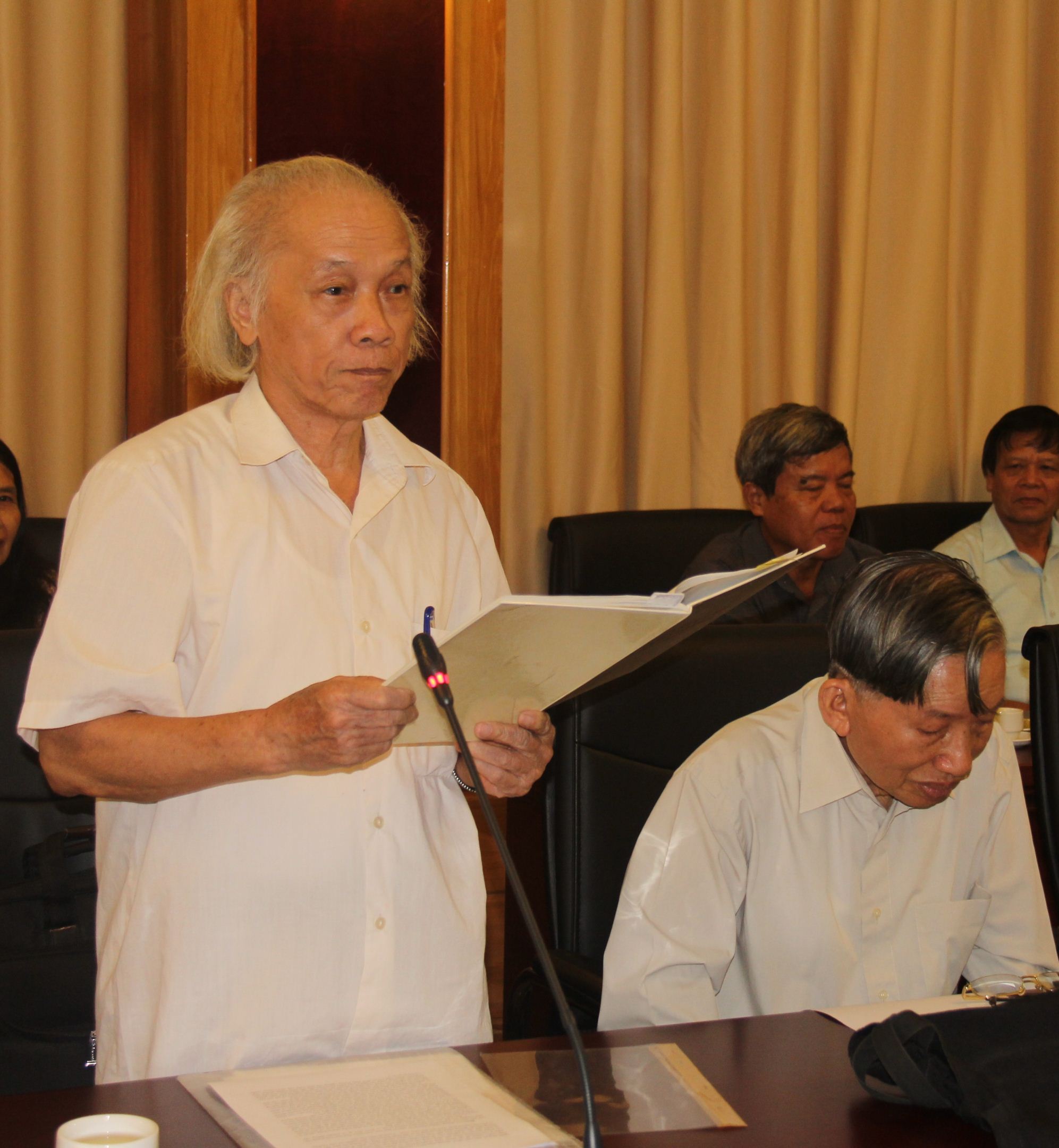
Associate Professor and People's Teacher Le Mau Han speaks at the seminar.
President Ho Chi Minh clearly stated: to maintain independence and freedom, it is necessary to strongly promote national momentum on the foundation of a new regime and a new type of person.Resistance must go hand in hand with nation-building. To build a nation, we need talented people.Under French colonial rule, over 90% of our population was illiterate. Talented individuals were also very rare in the country.
The government, especially President Ho Chi Minh, placed great importance on higher education to train talented individuals to serve the resistance and national reconstruction. The government decided to build upon and reform the old universities and colleges established by the French in Hanoi, which had just gained control of the country, and to develop several new universities to create a democratic, national higher education system for an independent and free Vietnam. The Government Council's meetings on September 22, October 4, October 8, October 31, and November 8, 1945, continuously discussed the policy of reopening the old universities and colleges and establishing new ones.
The French colonial university system did not establish a Faculty of Arts (Social Sciences and Humanities). With a correct understanding of the important role of social sciences and humanities in the social life of an independent nation, on October 10, 1945, President Ho Chi Minh signed Decree No. 45/SL establishing it.Faculty of Humanities, UniversityIn Hanoi, it was headed by Professor Dang Thai Mai, a revolutionary scholar with profound knowledge of ancient and modern, Eastern and Western cultures.
President Ho Chi Minh's decision to establish the Faculty of Literature at the University, as per Decree No. 45/SL dated October 10, 1945, was:a momentous eventThis marks a historic milestone in the establishment of a university-level training institution for the Humanities, now the Vietnam University of Social Sciences and Humanities.
In accordance with the government's policy, on November 15, 1945, at the Indochina University campus located at 19 Le Thanh Tong Street, Hanoi, the opening ceremony of the first course of the University of Vietnam under the democratic republic regime was held. President Ho Chi Minh presided over the ceremony, and several international guests also attended. The Director of University Affairs, Nguyen Van Huyen, delivered the opening speech. The Minister of National Education, Vu Dinh Hoe, presented the mission of the University of Vietnam in the new era.
The establishment of Vietnamese universities immediately after the successful August Revolution brought profound pride to professors and students of universities at that time regarding a university system of an independent and free Vietnam. It was a great motivation for professors and students to uphold their determination to build a national university system and be ready to face the extremely arduous challenges of the resistance and nation-building cause.
In that sense, the opening ceremony on November 15, 1945,ushering in a new erafor the Vietnamese higher education system.
The University of Social Sciences and Humanities is a continuation and further development of the tradition of the Faculty of Literature, founded by Ho Chi Minh on October 10, 1945, and of the faculties of Literature, History, and other social science faculties established in later years.
Looking back at the founding, development, and contributions of the Faculty of Literature, now the University of Social Sciences and Humanities, to the cause of resistance and national construction, and to the preservation and development of the Democratic Republic, now the Socialist Republic of Vietnam, helps us clearly see President Ho Chi Minh's strategic vision regarding the role of social sciences and humanities in the political and social life of the country.
Understanding the historical context in which the School was founded will help us to bettertWe are proud to have the opportunity to study and be taught at a school founded by Ho Chi Minh - the Ho Chi Minh School.
Author:Duy Anh
Newer news
Older news